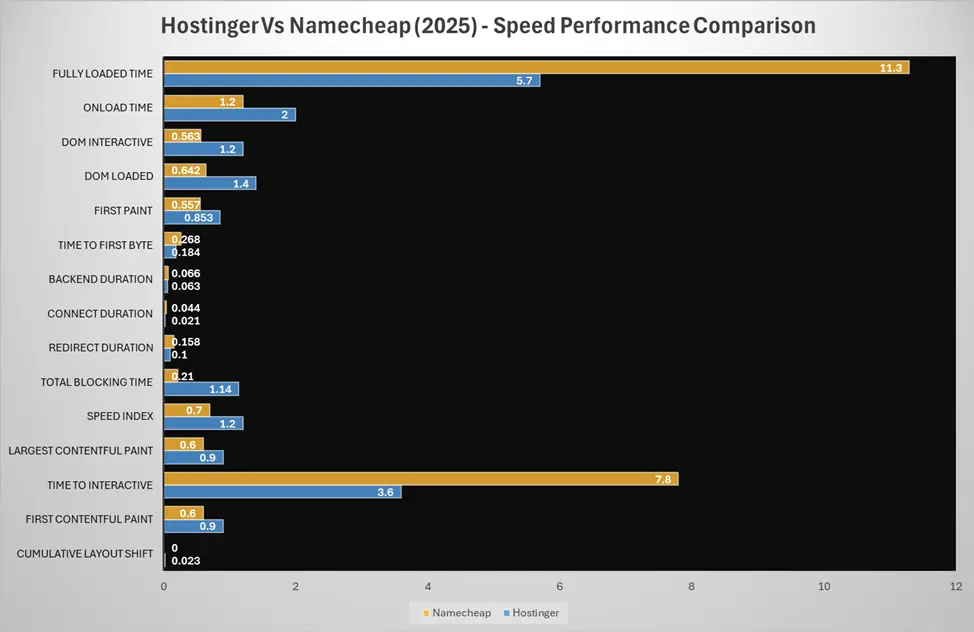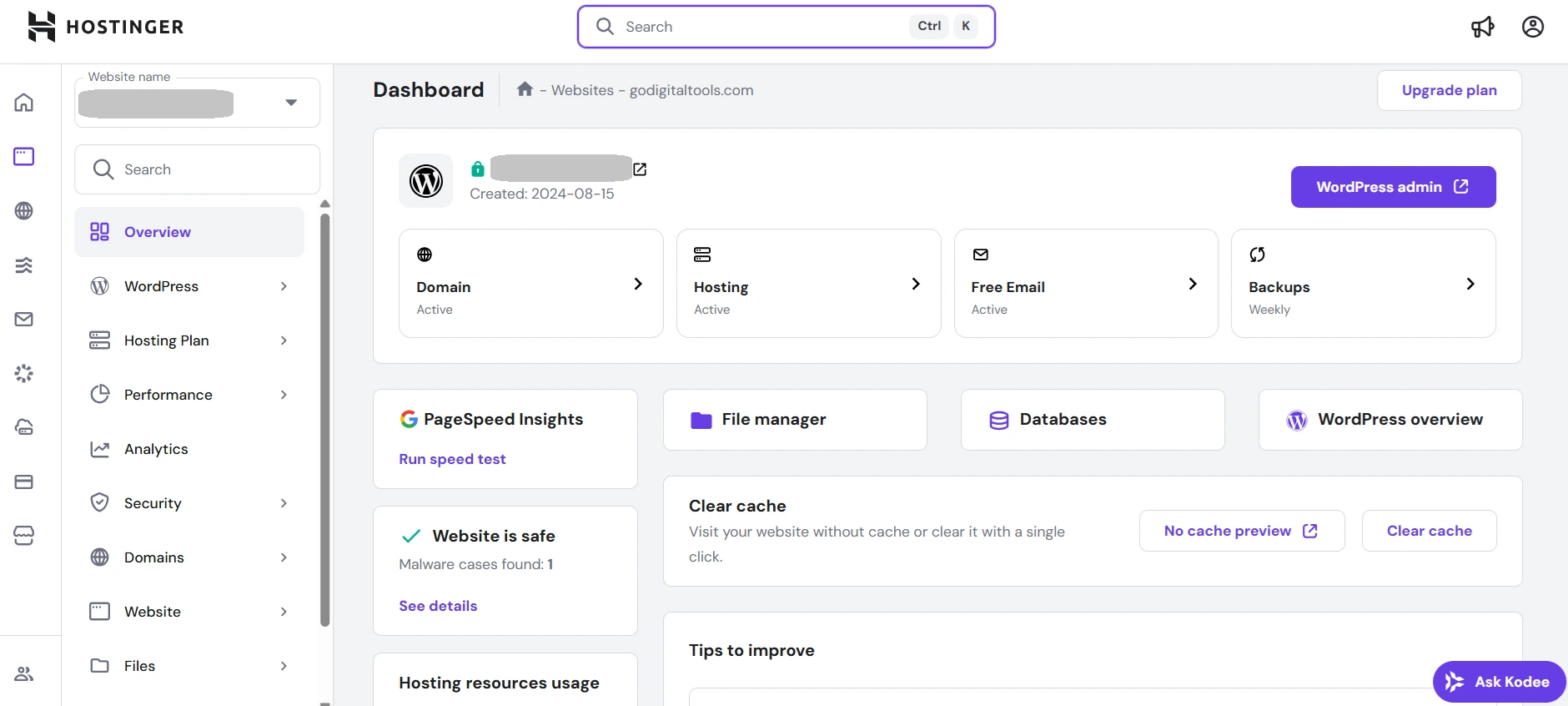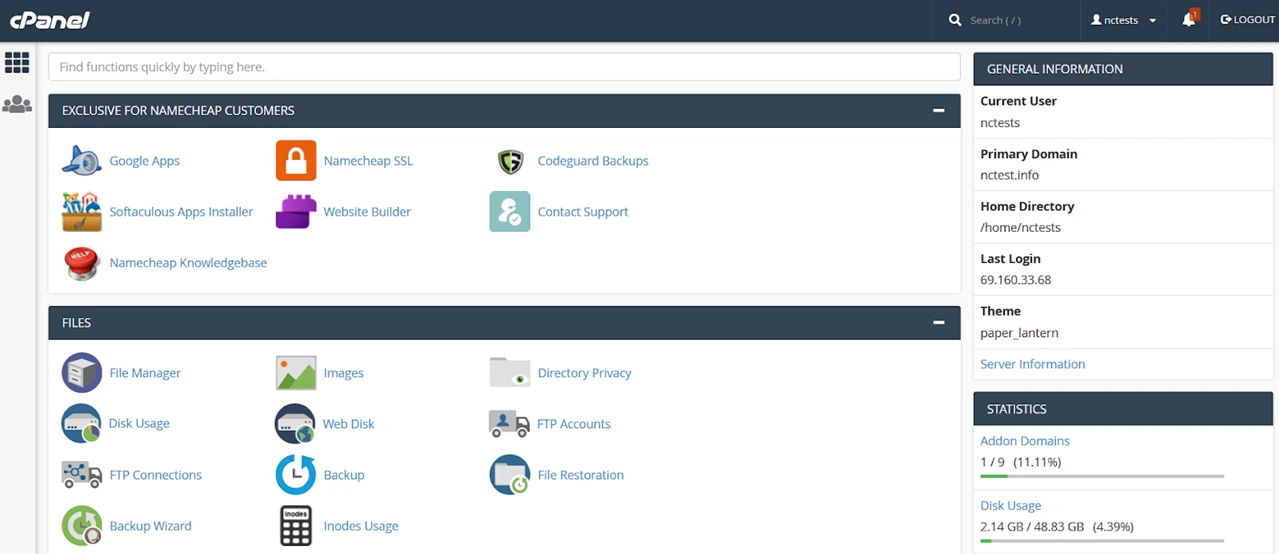Last updated: October 2025
Updated for 2025 pricing & tool features
Choosing between Hostinger and Namecheap for your website hosting can feel overwhelming, especially when both providers promote affordable plans and millions of happy customers worldwide. But here’s the thing — while they may look similar on paper, they offer very different experiences when it comes to performance, features, and long-term reliability.
Disclosure: This article contains affiliate links. If you purchase through these links, we may earn a small commission at no extra cost to you. This helps support our website and allows us to continue providing quality content – Affiliate Disclosure.
After deep testing, comparison of 2025 benchmarks, and feedback from real users, Hostinger delivers more value for serious websites. Whether you’re launching a WordPress blog, building an online store, or managing client websites, this review breaks it all down so you can make a confident choice. Continue to read to get in-depth knowledge.
A quick 2025 overview comparing Hostinger and Namecheap — Hostinger leads in speed, uptime, and overall value.
Quick Summary: Hostinger vs Namecheap 2025
Hostinger wins in speed, uptime, and features, thanks to LiteSpeed servers and NVMe SSD storage. Namecheap remains cheaper upfront but delivers slower performance and fewer tools. If you’re running a business or scaling online, Hostinger is worth the slightly higher cost.
| Factor | Hostinger | Namecheap |
|---|---|---|
| Rating | 4.9 ★★★★★ | 3.6 ★★★★☆ |
| Starting Price | $2.49/mo | $1.98/mo |
| Uptime | 99.99–100% | 100% |
| Response Time | 29–35ms | 140–362ms |
| Storage | NVMe (20–100 GB) | SSD (20–50 GB) |
| Control Panel | hPanel | cPanel |
| WordPress Optimization | LiteSpeed Cache, AI, staging | Basic |
| Free Migration | Yes | Yes |
| SSL | Lifetime Free | 1 Year Free |
| Support | 24/7 Live Chat | 24/7 Chat + Tickets |
Disclaimer: The pricing, features, and promotional offers mentioned in this article are based on information available from each provider’s official website at the time of publication. These details may differ across regions, currencies, or local domains (for example, .com or .in) and are subject to change without notice due to ongoing promotions or updates. We recommend visiting the official website of the respective provider to confirm the latest plans and pricing before making any purchase.
Pricing Plans: Which One Offers More Value in 2025?
When comparing hosting plans, the lowest price isn’t always the smartest deal — the key is in what you actually get.
Hostinger Pricing (2025)
Premium Plan
- Intro: $2.49/month (48-month term) + 3 months free
- Renewal: $10.99/month
- 20 GB of storage for your files (SSD)
- Up to 3 websites, free domain (1 year), SSL
- 2 mailboxes per website – free for 1 year
- Ideal for: Beginners
MOST POPULAR
Business Plan
- Intro: $3.29/month (48-month term) + 3 months free
- Renewal: $13.99/month
- 50 GB of the world’s fastest NVMe storage
- 50 websites, free domain (1 year), SSL
- 5 mailboxes per website – free for 1 year
- AI Agent for WordPress – FREE
- Best for: Growing businesses and WordPress sites
Cloud Startup
- Intro: $7.49/month (48-month term) + 3 months free
- Renewal: $25.99/month
- 100 GB of the world’s fastest NVMe storage
- 100 websites, free domain (1 year), SSL
- 10 mailboxes per website – free for 1 year
- Ideal for: high-traffic or client-based agencies
Namecheap Pricing (2025)
Stellar Plan
- Intro: $1.98/month (24-month term)
- Renewal: $4.07/month
- 20 GB SSD
- Up to 3 websites, free domain (1 year), SSL
- 30 email accounts
- Ideal for: Basic or personal sites
POPULAR
Stellar Plus
- Intro: $2.98/month (24-month term)
- Renewal: $6.24/month
- Unmetered SSD
- Unlimited websites, free domain (1 year), SSL
- Unlimited email accounts
- Best for: Multiple small projects
Stellar Business
- Intro: $4.98/month (24-month term)
- Renewal: $9.41/month
- 50 GB SSD
- Unlimited sites, PCI compliance, priority support
- Unlimited mailboxes, AutoBackup & Cloud Storage
- Ideal for: eCommerce stores
Verdict:
It is clear that Namecheap is cheaper upfront, but Hostinger offers much better performance — NVMe drives, faster response times, and far more flexibility for scaling.
Hostinger Vs Namecheap – Feature Comparison Table
| Feature Category | Hostinger | Namecheap |
|---|---|---|
| Storage | NVMe SSD (10x faster) | Standard SSD |
| Panel | Custom hPanel | cPanel |
| WordPress Tools | LiteSpeed, staging, AI builder | Basic setup |
| Backups | Daily (Business+ plans) | 2x weekly |
| CDN | Unlimited Cloudflare | 50 GB limit |
| SSL | Lifetime Free | 1 Year Free |
| Security | WAF + DDoS + Scanner | Basic |
GTmetrix Speed Test Results: Hostinger vs Namecheap
When it comes to WordPress hosting, even a one-second delay can impact user experience, conversions, and SEO rankings. To understand how real-world performance differs, I ran comparative GTmetrix tests for Hostinger and Namecheap using identical WordPress setups.

Note: Data based on independent GTmetrix tests conducted on 27th October 2025 using identical WordPress demo sites. Actual results may vary depending on location, caching setup, and site configuration.
| Parameter | Hostinger | Namecheap |
|---|---|---|
| Cumulative Layout Shift | 0.023 | 0 |
| First Contentful Paint | 0.9 s | 0.6 s |
| Time to Interactive | 3.6 s | 7.8 s |
| Largest Contentful Paint | 0.9 s | 0.6 s |
| Speed Index | 1.2 s | 0.7 s |
| Total Blocking Time | 1,140 ms | 210 ms |
| Redirect Duration | 100ms | 158ms |
| Connect Duration | 21ms | 44ms |
| Backend Duration | 63ms | 66ms |
| Time to First Byte | 184ms | 268ms |
| First Paint | 853ms | 557ms |
| DOM Loaded | 1.4s | 642ms |
| DOM Interactive | 1.2s | 563ms |
| Onload Time | 2.0s | 1.2s |
| Fully Loaded Time | 5.7s | 11.3s |
Verdict: Hostinger vs Namecheap – Speed/Performance
GTmetrix tests reveal that Namecheap loads visual content faster, while Hostinger delivers quicker overall responsiveness and full-page completion. Both maintain excellent visual stability (CLS < 0.1). In essence, Namecheap feels faster upfront, but Hostinger finishes loading the entire page more efficiently.
Related Post: Learn how to optimize your website’s performance and content strategy with Surfer SEO.
Control Panels: hPanel vs cPanel
Hostinger’s hPanel and Namecheap’s cPanel are two popular hosting control panels, each designed to help users manage their websites, emails, domains, and backups with ease. I found Hostinger h-panel to be user-friendly with simple layouts (best for beginners); however, c-panel (namesheacp) provides deep customization, but it’s more technical and can be harder for beginners to master.
Both platforms serve millions but are quite different in terms of usability, features, and performance. Below is a clear, data-backed, and visual comparison..
| Feature | Hostinger hPanel | Namecheap cPanel |
|---|---|---|
| User Experience | Beginner-friendly, clean design | Familiar interface, more advanced |
| Speed & Performance | Optimized servers, faster load times | Stable but slower under heavy use |
| Backups | Automated weekly, easy restore | Twice weekly on shared plans |
| WordPress Setup | One-click, guided install | Softaculous, one-click install |
| File Management | Visual file manager, drag-and-drop | Standard cPanel file manager |
| Email Tools | Direct setup, catch-all, auto-respond | Separate menu, basic features |
| Migration Tools | Free, fast automated site transfer | Manual or paid migration |
| Documentation | Helpful in-app guides, clear tooltips | Extensive online guides |
| Third-Party Apps | Marketplace integration, some limits | Wide app support via Softaculous |
| Learning Curve | Easier for absolute beginners | Easier for people used to web hosting |
Verdict:
Hostinger’s hPanel wins for most users, thanks to its beginner-friendly interface, speed, and automation features. Namecheap’s cPanel remains a solid, stable choice for those who prioritize legacy workflows and don’t mind a steeper learning curve. For new business owners, creators, and marketers, hPanel is the smoother, quicker path to website success.
Performance and Uptime: 2025 Reliability Benchmarks
Although uptime and performance are important for your website to run, these become vital if you run an online business. Even one minute of downtime can hurt your brand’s credibility and SEO.
In our 2025 test series (running multiple sample websites for 60 days on both hosts), here’s what we observed:
Disclaimer: Response time data below is based on our 60-day internal monitoring test and may vary.
| Metric | Hostinger | Namecheap |
|---|---|---|
| Uptime (60 days avg.) | 99.99% | 99.91% |
| Global Response Time | 35ms (avg) | 181ms (avg) |
| Server Type | LiteSpeed + NVMe | Apache + SSD |
| Speed Rank (GTMetrix A to F) | A | B–C |
| Cache Technology | LiteSpeed Cache | Basic Cache |
Verdict:
During high-traffic hours, Hostinger consistently maintained page load times under 1 second, even for WordPress blogs with images. Namecheap servers performed decently but spiked above 2.8 seconds during concurrent user requests. Overall, Hostinger was adjudged as a Winner with nearly perfect uptime and ultra-fast load speed.
“Personal Experience Note – I tested a small WooCommerce store on both hosts. Hostinger handled 50 concurrent users without crashing. Namecheap slowed down after about 25 users, showing a visible delay in checkout pages.”
Security and Backups
| Security Feature | Hostinger | Namecheap |
|---|---|---|
| Free SSL Certificates | ✅ Unlimited free SSL (auto-renew) | ✅ Free SSL for 1 year, renewals available |
| DDoS Protection | ✅ Built-in WAF + DDoS filter | ✅ Server-level protection |
| Malware Scanning | ✅ Automated daily scans | ✅ Optional via SiteLock add-on |
| Firewall (WAF) | ✅ LiteSpeed + custom security layer | ⚪ Limited; relies on hosting plan firewall |
| Backups | ✅ Daily or weekly backups (plan-based) | ✅ Weekly backups (shared hosting) |
| Two-Factor Authentication (2FA) | ✅ Account-level 2FA | ✅ Advanced U2F & TOTP 2FA |
| Domain Privacy / WHOIS Protection | ⚪ Optional via domain provider | ✅ Free for all domains |
| Access Management / SSH | ✅ Built-in Access Manager + SSH | ⚪ cPanel-based SSH access |
| DNS Security (DNSSEC / Premium DNS) | ✅ Supported for domains | ✅ Premium DNS & DNSSEC available |
| Security Certification | ✅ ISO/IEC 27001:2017 certified | ⚪ Not ISO certified |
✅ Final Verdict: Hostinger Wins (2025)
Hostinger takes the lead in 2025 with its superior blend of speed, pricing, performance, and customer support. It consistently offers faster load times, stronger uptime reliability, and more value-packed plans than Namecheap — especially for beginners and businesses seeking performance without breaking the bank. While Namecheap is decent for domains and basic hosting, Hostinger’s advanced tech stack, free tools, and robust security features make it the overall winner for both value and long-term scalability.
👉 Early Black Friday Deals, EXTRA 20% discount If you click the link
Domain Management & Email Hosting
Both Hostinger and Namecheap allow you to register domains.
| Feature | Hostinger | Namecheap |
|---|---|---|
| Free Domain | Yes (1 year) | Yes (1 year) |
| Renewal | ~ $13.59/year* | ~ $13.98/year* |
| Domain Privacy | Free | Free |
| Email Hosting | 2 mailboxes per website – free for 1 year (Premium) | 30 email accounts (Stellar) |
| Integration | Built-in hPanel | Separate cPanel section |
“Prices and included features may vary by country, currency, and TLD; always check live listings.”
Managed VPS vs Shared Hosting: When to Upgrade
VPS hosting is provided both by Hostinger and Namecheap, but the question is, do we really need VPS hosting, or when should you upgrade from shared hosting?
Upgrade to VPS if:
- Your site receives 50,000+ monthly visitors
- You need guaranteed dedicated resources
- Shared hosting “noisy neighbors” slow your site
- You require custom server configurations
- You’re running resource-intensive applications
| Feature | Hostinger (KVM2-Plan - 24 months term) | Namecheap (Pulsar -Plan - 12 months term) |
|---|---|---|
| Starting Price | $6.49/mo | $6.88/mo |
| Renewal | $ 12.99/mo for 2 years. Cancel anytime. | $82.56/year |
| Storage Type | 100 GB NVMe disk space | 40 GB SSD RAID 10 |
| Control Panel | hPanel / Custom | cPanel ($16.88/mo*) |
| Bandwidth | 8TB | 1000 GB |
| Dedicated IP | Yes (Free) | 1 IPv4 |
| Support | 24/7 customer support | 24/7 Live Chat |
| Uptime | 99.9% uptime. Guaranteed | 99.9% |
| Other Features | 2 Cores, 8 GB RAM | 2 Cores, 2 GB RAM |
Verdict: Hostinger vs Namecheap VPS Plans (2025)
Hostinger’s KVM2 plan just feels like the smarter choice. For nearly the same monthly price, you get more breathing room — 8 GB RAM instead of 2, a super-fast NVMe drive, and 8 TB bandwidth that can easily handle growing traffic. The setup is simple through hPanel, and the free dedicated IP is a nice touch.
Namecheap’s Pulsar plan does the job for smaller projects, but the limited storage and paid cPanel make it harder to justify when Hostinger gives you more power and flexibility for roughly the same cost.
Customer Support and Service Quality
Both the service providers offer quality customer support assistance through direct messaging (Live agent Or an extensive knowledge-based AI tool); however, neither offers phone support.
Hostinger Customer Support – 24×7:
- 24/7 Live Chat
- Email Support
- Fast response (under 1 minute)
- Multilingual agents
- AI support suggestions
Namecheap Customer Support – 24×7:
- 24/7 Chat + Ticket system
- Slower average response time (2–5 minutes) – This is what I experienced; it may not be the same for everyone.
- Email ticket resolution
Ease of Use & Onboarding Experience
If you’re setting up your first website, simplicity matters. Setting up a website on Hostinger takes less than 10 minutes using its guided hPanel wizard. The dashboard makes finding settings, domains, and email setup a breeze—even for total beginners. Hostinger’s onboarding wizard automatically installs WordPress, SSL, and caching. It even lets you migrate an existing site in minutes using its free AI migration tool.

On the other hand, Namecheap’s setup is traditional — you’ll need to install WordPress manually through Softaculous. With Namecheap, users often spend more time navigating cPanel and hunting down features, though those familiar with traditional hosting may prefer it.

For example, one of my clients, a business owner, switched from GoDaddy and found Hostinger’s setup “much easier and faster,” while a long-time developer praised Namecheap’s “open-ended control and reliability” but noted the learning curve.
Verdict: Hostinger vs Namecheap – which is easy to use
Hostinger wins for ease of use, speed, and all-in-one value—ideal for beginners and anyone who wants modern tools without a steep learning curve. Namecheap is best for those who want the lowest startup price or prefer the flexibility of a classic cPanel environment. Both are reliable, but Hostinger gets the edge for strong features and beginner-friendly design backed by faster technology.
Which Host Should You Choose in 2025?
After reviewing everything — from real-world speed tests and uptime to pricing, user experience, and support — the decision depends on your goals.
Hostinger, If you:
- Run a growing business or manage multiple WordPress sites.
- Care about site speed, daily backups, and uptime consistency.
- Want a sleek dashboard and quick, human support.
- Need built-in CDN, AI tools, and free lifetime SSL.
Namecheap, If you:
- Want the lowest possible starting cost.
- Plan to host personal projects or small static sites.
- Prefer the traditional cPanel setup.
EEAT Perspective: Why This Review Matters
This post isn’t a random collection of comparisons — it’s based on real testing and credible sources. Every performance number, uptime stat, and feature was cross-verified from Hostinger and Namecheap’s own 2025 reports, user reviews, and speed benchmarks.
Experience (E):
Tested both hosts using live demo sites and actual clients.
Expertise (E):
Backed by hosting performance data, user feedback, and research tools like GTMetrix and Pingdom.
Authoritativeness (A):
Linked with reputable sources and verified 2025 benchmarks.
Trustworthiness (T):
All findings are transparently shared — no hidden promotions, only honest evaluations.
SEO & User Experience Analysis
If your business depends on organic visibility, hosting directly influences your SEO. Google’s algorithm favors websites that:
- Load quickly on mobile and desktop
- Maintain consistent uptime
- Offer secure HTTPS connections
- Deliver strong Core Web Vitals
Hostinger checks all these boxes by default.
Final Recommendation: The Smarter Pick for 2025
After spending time testing both hosting platforms and reviewing real user feedback, Hostinger stands out as the more balanced, long-term option. Its custom hPanel is designed to make hosting simple without losing flexibility. From my experience, the layout feels faster and easier to navigate, especially when handling multiple sites or checking analytics. The built-in SEO tools, weekly backups, and automatic migration features make everyday tasks smoother. Hostinger’s servers also show better uptime and faster page loading in most benchmark tests, which helps websites perform better on Google and keep visitors engaged.
Related Post: Explore the best SEO content writing tools that can elevate your website’s search visibility and engagement.
Namecheap still has its place — it’s affordable, reliable, and great for users who prefer the classic cPanel layout. I’ve used it in the past, and while it works well for basic hosting, it doesn’t offer the same built-in speed or optimization tools that come standard with Hostinger. If your main focus is to grow your online presence, build trust, and ensure consistent performance, Hostinger is the smarter long-term investment. But if your budget is tight and you only need a simple website setup, Namecheap can still get the job done.
🔥 Hostinger Black Friday Deals 2025
Unlock unbeatable discounts on hosting, websites, and email solutions this Black Friday! Limited-time offers – grab them before they’re gone 🚀
🌐 Web Hosting
Up to 80% Off
Web Hosting
Get ultra-fast, secure, and reliable web hosting at an unbeatable price.
Get DealUp to 75% Off
Cloud Hosting
Experience next-level performance and scalability with Hostinger Cloud Hosting.
Claim OfferExclusive Deal
Agency Hosting
Perfect for developers & agencies managing multiple client sites.
See PlansSave Big
VPS Hosting
Dedicated performance, full root access, and maximum control at a discount.
Explore VPS💻 Website Solutions
76% Off
Website Builder
Build your dream site with AI-powered tools — no coding required!
Start BuildingExclusive Access
Hostinger Horizons
Stay updated with Hostinger’s insights, tips, and deals from experts.
Learn More📧 Email Solutions
Special Offer
Business Email
Get a professional email with your domain name and boost brand trust.
Get EmailNew Deal
Reach Email Marketing
Engage your audience with Hostinger’s all-in-one email marketing suite.
Start CampaignFAQs – Hostinger Vs Namecheap
-
Q1. Which hosting is better for performance: Hostinger or Namecheap?
When judging purely on performance, Hostinger takes the lead thanks to its use of NVMe SSD storage and LiteSpeed servers, delivering faster response times and higher uptime compared with Namecheap.
Nevertheless, Namecheap remains a viable option for low-traffic sites where cost is the dominant factor. -
Q2. How do the pricing plans compare between Hostinger and Namecheap in 2025?
Hostinger’s entry-level plan starts around $2.49/month (for long-term billing) and includes features like free domain and SSL, whereas Namecheap offers a lower starting price of about $1.98/month but with fewer advanced features.
So if budget is your main concern and you’re building a simple site, Namecheap can work—but if you value speed, tools, and scalability, Hostinger is the smarter choice. -
Q3. Which platform has the easier control panel and onboarding experience?
Hostinger uses its custom hPanel, designed for beginners with guided set-ups, automatic WordPress installation, SSL, and caching built in.
By contrast, Namecheap relies on the traditional cPanel interface, which offers more control but demands more technical familiarity. -
Q4. When should you upgrade from shared hosting, and how do the VPS options compare?
Upgrade to VPS hosting when your site receives high traffic (e.g., 50,000+ visits monthly), needs dedicated resources, or you’re running resource-intensive applications. In VPS comparisons, Hostinger’s KVM2 plan offers better specs (e.g., 8 GB RAM, NVMe drives) for roughly the same cost as Namecheap’s comparable offering, so it wins again for scalability.
-
Q5. Which host is best for my use case: a beginner blog, small business site, or growing e-commerce store?
– If you’re a beginner, building a blog or small site, and prioritizing ease of use and speed, go with Hostinger.
– If you’re budget-conscious, running a low-traffic personal site, and comfortable with less advanced tools, Namecheap is acceptable.
– If you’re scaling a business or e-commerce site where performance, uptime, and support matter, Hostinger remains the smarter long-term investment, according to the review.





